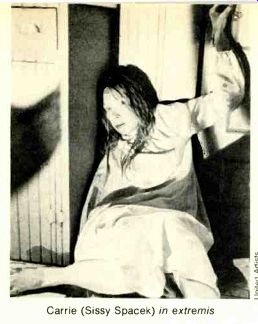
above: Carrie (Sissy Spacek) in extremis
A Poignant Backdrop for Cinematic Horrors
Pino Donaggio's ingeniously underplayed score for Brian de Palma's suspenseful Carrie heralds a major film-music talent.
by Royal S. Brown
ALTHOUGH A RELATIVE NEWCOMER, film director Brian de Palma has a streak going that is quite rare in the movie business: The musical score for each of his last four films has made it to disc.
Of course, A&M's release of Paul Williams' music for the 1974 Phantom of the Paradise (SP 3653) was not a surprise, since it is a pop-rock score. But De Palma was the first American auteur since Alfred Hitchcock to use the late Bernard Herrmann. Ironically, it took two years and a one-man operation to get on record Herrmann's brilliant score for the 1973 Sisters (Entr'acte ERQ 7001, May 1975), the first film in De Palma's recent suspense-oriented phase. London Phase-4 wasted little time in bringing out the Herrmann music for Obsession (SPC 21160, November 1976), though it had taken the film a good year to get into distribution after its completion in the summer of 1975.
No doubt the musical score for Carrie owes its quick release on United Artists to the immense popularity of the movie, a devastatingly effective suspense-tragedy. Pino Donaggio, a thirty-five-year-old Italian composer residing in Venice, is all but unknown in this country. He had, however, scored another suspense film (also with psychic-phenomena overtones) before Carrie, Nicholas Roeg's Don't Look Now, and it was because of this music that De Palma chose him.
De Palma told me in a conversation last December that he would have used Herrmann for the third time had the composer still been alive, so it is not surprising that the Carrie score evokes Herrmann more than once. Every so often the soundtrack hints at the Psycho violin shrieks (not heard on this recording), and there are allusions to the Sisters music. In a more general way, the sustained strings-against-strings heard in the "Mother at the Top of the Stairs" sequence bring to mind one of Herrmann's favorite devices.
But as much as I respect Herrmann's immense talents, I do not feel he would have been the right man to do Carrie. One of my complaints about Obsession was that the excessively serioso score got locked in a death grip with De Palma's unaccountably humor less and heavy-handed direction, so much so that the film and music never got out of each other's way. Donaggio's score, by contrast, does not try to create constant suspense and drama. Instead of suggesting catastrophe around every corner, the music often has a poignant simplicity that highlights the deep, and very sad, human dimension so skillfully built up by De Palma. The title theme, for instance, is an ingenuous flute solo played over sustained, slowly modulating harmonies vaguely reminiscent of Georges Delerue, but with much more bite.
Another good example of the score's use of under statement can be found in the climactic scene after Carrie (Sissy Spacek) returns home from the prom.
Rather than pulling out all the stops to accompany the violence that occurs, Donaggio uses a sad little ostinato (played principally on the piano) that de emphasizes the violence and greatly enhances the viewer's involvement with the heroine. For part of this scene, in fact, Donaggio had originally composed something even more lyrical, following his tendency to go in just the opposite direction when there is a large amount of suspense or terror. De Palma got him to write music with "more drive" without sacrificing the basic character, and the result quite simply drains the emotions. Also perfect for the film are the brass chorales evoking the pervasive religious atmosphere in Carrie's home and the majestic full-orchestra chorale that melts away into low-string unisons and a chilling electronic vibrato as the house collapses.
As is usual on recent soundtrack recordings, this album contains two vocals. The first ("I Never Dreamed Someone like You Could Love Someone like Me") is heard during the prom scene and has very appropriate lyrics (by Merrit Malloy). The second, a vocal setting of the title theme, is fortunately never heard in the picture--its lyrics (also by Malloy) are quite inappropriate. Both are breathily but nicely sung by Katie Irving.
Besides musically documenting one of 1976's best films, this excellently recorded album introduces a major talent in film scoring. As De Palma said, "I have great belief that Donaggio is going to be one of the best, because he's so good already." I agree wholeheartedly.
CARRIE. Original film soundtrack recording. Composed and conducted by Pino Donaggio; Katie Irving, vocals. [LeRoy Holmes, prod.] UNITED ARTISTS LA 716H, $7.98. Tape: EA 716H, $7.98.
(High Fidelity, May. 1977)
Also see:
Link | --Link | --Do We Overestimate Beethoven?